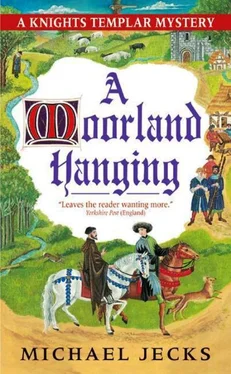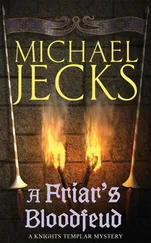Michael Jecks
A MOORLAND HANGING
1996
Clambering up the long, shallow gradient to the mass of rock at the summit, the last thing on Thomas Smyth’s mind was the man who was shortly to die. Smyth was concentrating solely on the dull pain of his strained muscles, and wondering how much farther he must go.
Just before the last slope he had to pause to rest, his hands on his hips as he panted. It was becoming cooler as evening approached, a relief after the day’s searing heat. Glowering at the tor above, he gave a brittle smile. After this expedition he knew he must accept he was no longer a young man. Though his mind was the same as when he had first come here, a lad of not yet twenty, that was more than thirty-two years ago now. Thomas was well past middle age.
Gazing around him, he saw thin feathers of smoke rising eastward in the still evening air: the straggle of crofts on the Chagford road were settling for the night. He could hear a dog barking, a man shouting, shutters being slammed over windows, and an occasional low grumble from oxen in the byres. After the misery of 1315 and 1316, when the whole kingdom had been struck with famine, it sounded as if the country had returned to normal. This little vill in the middle of Dartmoor stood as proof of the improvement in the weather, which now, in 1318, promised healthy harvests at last.
But Smyth’s anger, never far from him now, would not let him survey the view in peace. He felt his gaze being pulled back. South and east, he knew the gray mists were caused by his new blowing-house, whose charcoal furnace melted the tin which was the primary cause of his wealth. It was the other fires northward which made him set his jaw and glare, the fires from the other men, the miners who had arrived recently and stolen his land.
He himself had not been born here. It was many years ago, while serving as a soldier in the Welsh wars, that he had first heard tell of the huge wealth to be amassed from working the ore that lay so abundantly on the moors. Thus, when the battles were done, he had meandered southward, intending to take his share.
Back then, in 1286, he had been a gangling nineteen year old – a poor man with no future. In those days, a large part of this area around the West Dart River had been uninhabited, and only a few tinners struggled to work the land for profit. Taxes were crippling, raised whenever money was needed for wars – and it was rare for the old King not to be at war. Many had already left the land by the time Thomas arrived, allowing him to increase his works for little cost, and though it had taken some years he had steadily built up his interests until now he was the wealthiest tinner for many miles, employing others to keep the furnaces lighted and the molds filled with tin. If he did not own the land, that was merely a technicality – and a financial saving. By all the measures he valued, the land was his: he could farm tin and take the profits; he could bound tracts of land wherever he wanted; he had a seat at the stannary parliament. These were the ancient rights of the stanners of Devon, and he made full use of them.
But others had come, stealing parcels of land he considered his own, working it to their own advantage, ruining his efforts and making him look foolish in front of his neighbors. It was intolerable.
With a last baleful glare, he set his face to the hill once more and continued climbing.
Behind him, George Harang smiled in satisfaction. He had caught a glimpse of Thomas’ expression, and knew what it signalled. At last the old tinner had made up his mind; he was going to defend his land and investments. From George’s perspective, the retaliation was long overdue – not that he would ever have said so openly. He respected his master too much.
They were ascending the southern side of Longaford Tor, and soon George could see the yellow glow of a fire up near the conical mound of stone at the top. Nodding toward it, he walked a little ahead, his hand on his knife, but there was no need for caution. The three men were waiting for them in the shelter of the small natural bowl in the grass as agreed. Barely acknowledging them, Thomas Smyth’s servant strode past the little band, to stand with arms folded as the discussion began.
Watching his employer, George could see that the inner strength he had admired as a lad had not diminished. Though he was only some five feet six inches tall, Smyth had the build of a wrestler, with massive arms and thighs, and a chest as round and solid as a wine barrel. He had a natural way with the men who worked for him, a commander’s ability to put all at ease in his company. As always he squatted with them by their fire, his square chin jutting in aggressive friendliness as he spoke, dark eyes alight, thick eyebrows almost meeting under the thatch of graying hair. In the kindly light of the flames, George felt sure his master could have been mistaken for a man of ten, maybe even twenty, years younger. The fierce glitter in his eyes, the sudden stabbing movements of his hands as he spoke, the quick enthusiasm in his words, all seemed to indicate a man in his prime, not one who was already one of the oldest for miles around.
When Thomas had finished speaking, his eyes held those of the other men for a moment as if to confirm that he had selected the right group. Then, satisfied, he clapped the two nearest on their backs, rose and started off back down the hill, moving more quickly now, George following behind him.
“They’ll do it,” Thomas said meditatively, gazing eastward with his hands hooked into his thick leather belt as they walked south to their horses.
“Yes, sir,” George agreed, and was surprised when his master spun round to stare at him, frowning in concentration.
“You think they’re right for this, don’t you?”
George nodded with conviction. “Harold Magge, he’d do anything you’d ask,” he said firmly while the almost black eyes held his. “And Stephen the Crocker and Thomas Horsho’ll do what Harold tells them.”
Thomas turned back to the view. “Good,” he said softly. “I’ve had enough. I want my land back.”
South and east of them as the two men descended, Adam Coyt was putting the last of his cattle in through the gate, and setting off with his dogs to stroll round the old moorstone enclosure while he checked for weaknesses in the wall.
He had spent all his life on the moors. As a boy he had played out on the open lands, the huge rolling plains between Lydford and Chagford, watching the creatures through the seasons. Rabbits, deer and hart, wolves and foxes, he knew them all as well as he knew the animals on his own farmstead. A moorman, he had known no other life. His father had lived here and his father before him, all the generations working in the cruel climate which so often broke those who did not respect it.
Like a tinner, Adam felt a close affinity for the land, but in his case it was bred of experience and fear. Though he had prospered, Dartmoor had exacted its toll, taking his wife and son. He could not blame the moors; it was the way of the forest, that was all. She should not have gone out when it had begun to snow, and was mad to try to return later. Crockern, Dartmoor’s spirit, deserved respect from people. There was no use in praying to God for help, not when Crockern had sent the bitter winds to scour the land. When Adam had found her body, slumped and curled into a small ball of agony, the flesh frozen blue-white, he had wept, but not for long. There was no sense in tears – he had work to do. A year later his son too had succumbed, unable to survive the bitter winter of 1316 when the food spoiled under the sheeting rains. Then Adam had not even been able to cry. It had been hard, he had tried to give the lad enough, taking from his own meager portion to feed him, but it was insufficient and the crying had increased in volume daily until Adam was almost relieved when it faded and at last was stilled. A month later when the thaw had come he had made the cruel journey to Widecombe Church – the small pathetic body could no longer be kept in its barrel, protected in salt like a haunch of pork, and he wanted the boy to be buried with his mother.
Читать дальше












